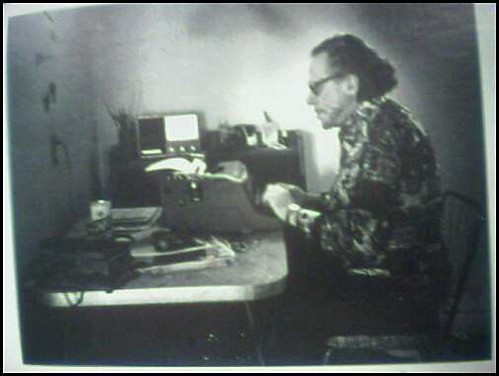 |
| Charles Bukowski. Photo by Carl via Flickr CC BY 2.0 |
 Post Office by Charles Bukowski
Post Office by Charles BukowskiMy rating: 3 of 5 stars
I knew nothing of Bukowski until his work was recommended to me, especially his poetry, but I opted for his first novel instead. I recall watching Mickey Rourke and Fay Dunaway in Barfly, but I was just out of high school and it bored me. I found Woody Allen movies to be boring, then, too. Today, Woody Allen's movies are my favourite, so it might be worth giving Mickey another chance soon. Post Office reads like a cross between Jack Kerouac and a beatnik version of John Steinbeck. The cover blurb suggests his punctuation is all over the shop, but aside from a few instances of bizarrely-placed periods, it wasn't as distracting as I thought. It was also meant to be a story about American low-lifes, but that, too, seemed to be a misnomer. The protagonist, Henry Chinaski, is an anti-hero par excellence. His womanising, boozing, and gambling may have been somewhat shocking in 1971, but by today's standards, his conventional vices are more Dean Martin than Ozzy Osbourne. Even Kerouac's Sal Paradise was more hard-core than Chinaski. I'd even go so far to say that Chinaski was a moralising anti-hero, with moments of compassion and Protestant-like work ethic interrupting his otherwise conventional shenanigans. At the same time, much like Burt Reynolds in the opening scene of The Longest Yard (1974), Chinaski isn't, let's say, very chivalrous. But then he is a dog-lover, so his crassness balances itself out somewhat. I couldn't put the book down and finished it in one sitting. There are some elements of unconventional literature, such as an entire chapter of official letters from the post office, but these are used cleverly and the reader will sympathise with Chinaski's boredom with bureaucracy. One gets the sense that Chinaski is not only physically missing while one reads this part, and the innovation serves its purpose well. I am not sure if I am ready to start reading poetry in detail, but this work, along with my current reading of Thomas Carlyle's On Heroes, Hero-Worship, and The Heroic in History with one chapter devoted to Dante and Shakespeare focusing on "The Hero as Poet", has piqued my interest. If one can suspend current realities and overlook the attitudes of the past that are distasteful in the present, then the work is enjoyable. But what excites me is that this is Bukowski's first novel, written at age fifty. His protagonist is about my age now at the end of the book. Typically, the anti-hero has upset all the other characters by about age 30, and the masterpiece was authored by some 23 year-old genius. Rather, Bukowski leaves me with at least a sliver of hope that I haven't squandered my last 47 years entirely.
View all my reviews
 Donate
Donate




